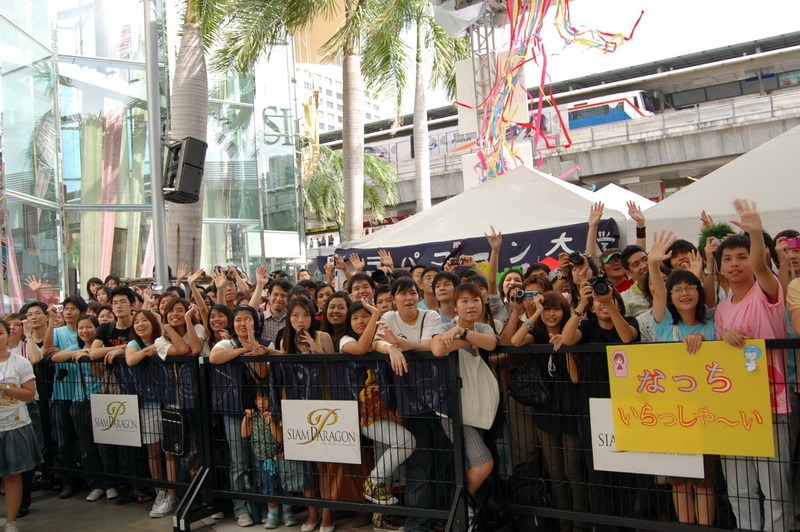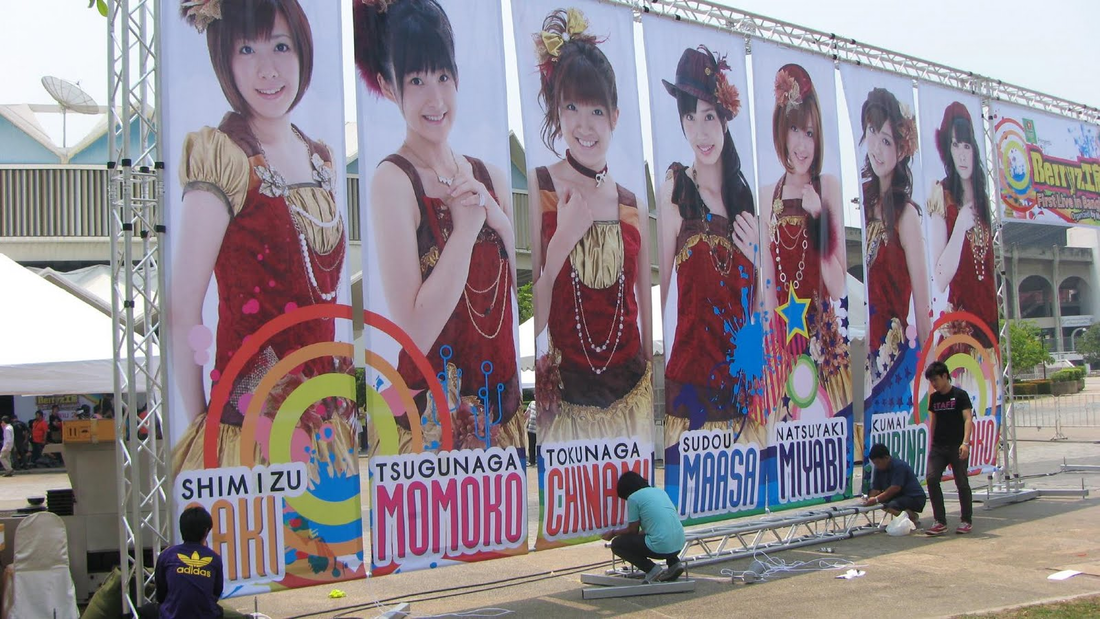|
Author's Note: "IDOLS in Thailand" is a four-part series on the growth of idols and idol culture in Thailand, and how the modern Thai idol industry was largely influenced by Japanese idols. I would like to extend my thanks to my informants in Thailand, who have graciously lent their time to show me the history of idol culture in Thailand and acquaint me well with it, so that I may pass it forward. In recent years, Japanese idol culture has become wildly popular overseas. But, in one particular country in Southeast Asia, Japanese idol culture has spawned a local idol culture unique to that country itself and a number of performers / groups that largely follow the Japanese idol concept. That country is Thailand. The explosive growth of Japanese idol culture in Thailand was recently showcased in an NHK segment (“Japan ‘Idolizes’ Thailand”), which takes a look at developments including the launch of a Japanese-Thai idol group. The segment, of course, mentions the hit idol group BNK48, one of the many international sister groups of Japan’s AKB48. BNK48 is often credited with popularizing idol culture in Thailand and inspiring numerous similar Thai idol groups, practically transforming Thailand into the 48th prefecture of the Japanese idol universe. Although the many other Thai idols and idol groups do not enjoy the same level of exposure and fame, they are successful because they are backed by an idol fan scene in Thailand that is relentlessly active and passionate about idols. But, where did these fans come from? How did a large-scale interest in idols in Thailand start off in the first place? We found answers after taking a closer look at BNK48’s home city of Bangkok, which is the host city for large-scale events such as Japan Expo Thailand and the former Japan Festa in Bangkok. As it turns out, Bangkok has a long history of being a gathering point for Japanese idol fans—the oldest evidence we found suggests the existence of Japanese idol fandoms as early as the mid-2000s. Furthermore, it is actually one of the most significant idol group “umbrellas” that shaped idol culture in Japan today that also sparked a Japanese idol wave in Thailand. In 2007, Up-Front Promotions—the company who manages the many Hello! Project idol groups—agreed to work with Mainichi Academic Group—the Bangkok-based organizers of the Japanese cultural event “Japan Festa in Bangkok”—to bring Japanese idols to Thailand. What would subsequently become the biggest driver of Japanese idol culture in Thailand was also (at the time) the biggest driver of idol culture back in Japan: Hello! Project was experiencing its “Platinum era”, and its girl groups--Morning Musume, °C-ute, Berryz Koubou and others—were best-selling artists driving a resurgence in the popularity of idols in Japan. The appearance of Hello! Project idols in Thailand sparked long-time fans and created many new ones, as the following years saw the appearance of actual Japanese idols in-person at numerous events in Thailand. Solo appearances were made every year at Bangkok’s Japan Festa events by Morning Musume members: Abe Natsumi (in 2008), Fujimoto Miki (in 2009), and Yoshizawa Hitomi (in 2010) all visited Japan Festa. Each event attracted a large gathering of idol fans, and featured many cover groups—dance groups that would perform covers of the original Hello! Project songs and dances. By 2011, the popularity of these guest appearances was to an extent that the organizers began calling for repeat performances: Yoshizawa Hitomi was selected to return for a consecutive year, this time with Ishikawa Rika and performing as J-pop duo Hangry & Angry. Abe Natsumi performs “Love Machine” at Japan Festa in Bangkok (2008) Fujimoto Miki watches while a cover group dances her song “Romantic Ukare Mode” (2009) While events were one way to drive fan excitement, numerous developments were also being made outside of events, enhancing Thai fans’ upbringing into idol culture and fandom. In 2009, a Thai company (GMM International Thailand) decided to purchase the rights to distribute Hello! Project CDs in Thailand. According to Thai blogger Timmii97, GMM made a concerted effort to popularize H!P in Thailand by not only distributing the CDs using their purchased rights, but also by promoting the idols in Thai TV programs, and collaborating with fans by hosting gatherings and sending fan letters to Japan (which often received responses from the idols themselves). With the sales of Hello! Project CDs proving to be a big hit in Thailand, Mainichi Academic Group announced in October 2009 that “a group” from Japan would be visiting Thailand in 2010. Which group it would be was completely unspecified, but fans were quick to guess that it would be one of the three major Hello! Project groups active at that time (Morning Musume, °C-ute and Berryz Kobo). The exposure that this group would have—given that they would be set to attend Japan Festa in Bangkok and potentially be seen by tens of thousands of attendees—would be massive. Berryz Koubou interview on Thai TV program Wake Club in 2009 Video of Berryz Koubou live announcement, posted by blogger Timmii97 Up until then, fans had consistently voted Berryz Koubou as their top artist, with one Thai TV channel ranking Berryz as the second most popular Asian artist in Thailand. The announcement that Berryz Koubou would be performing in 2010 was made at a fan meeting event held by both GMM and Mainichi. Fans present were keen to display their excitement, cheering and jumping in awe when the familiar sound of a Berryz song played, and the images of the girls were shown on-screen. On the following year, on March 27, 2010, Berryz Koubou became the first Japanese idol girl group to perform in Thailand. After their initial visit, the strong fanbase for Japanese idols in Thailand persisted, and the amount and size of Hello! Project events intensified. In 2012, Morning Musume members Michishige Sayumi, Tanaka Reina, Fukumura Mizuki, Iikubo Haruna and Ishida Ayumi visited Thailand to hold a handshake event, as part of a series of overseas events celebrating Hello! Project’s 15th anniversary. Berryz Koubou themselves would return several times, with three members visiting for Japan Festa in Bangkok in 2012, and full-member solo concerts in 2013 and 2015—the 2015 event being their last overseas event before they officially disbanded in March 2015, and one of the few times a “Naruchika event” was held overseas. Footage of Berryz Koubou’s first live in Thailand in 2012 In the late 2000s and early 2010s, social media was on the rise with the launch of websites like Facebook, Twitter and YouTube for sharing content. These websites were very new and not as easily accessible in developing countries like Thailand (which even now is still classified as one). Nevertheless, the development of social media was timely and online communication served as the basis for concerted efforts by both organizers and fans. This helped Hello! Project establish itself in Thailand, which in turn sparked a Japanese ‘J-idol wave’ that has had an enormous impact on pop culture in the country for more than a decade.
-Daryl |
Search
Contributors◆ Angie
◆ Hinacchi ◆ Manuel ◆ Megan ◆ Molly ◆ Rose ◆ Rubi ◆ Sylvia ◆ Teepu ◆ Tiffany ◆ Winfield Support Us On Patreon!Archives
August 2024
|
© 2014-2024 A-to-J Connections. All Rights Reserved.






 RSS Feed
RSS Feed